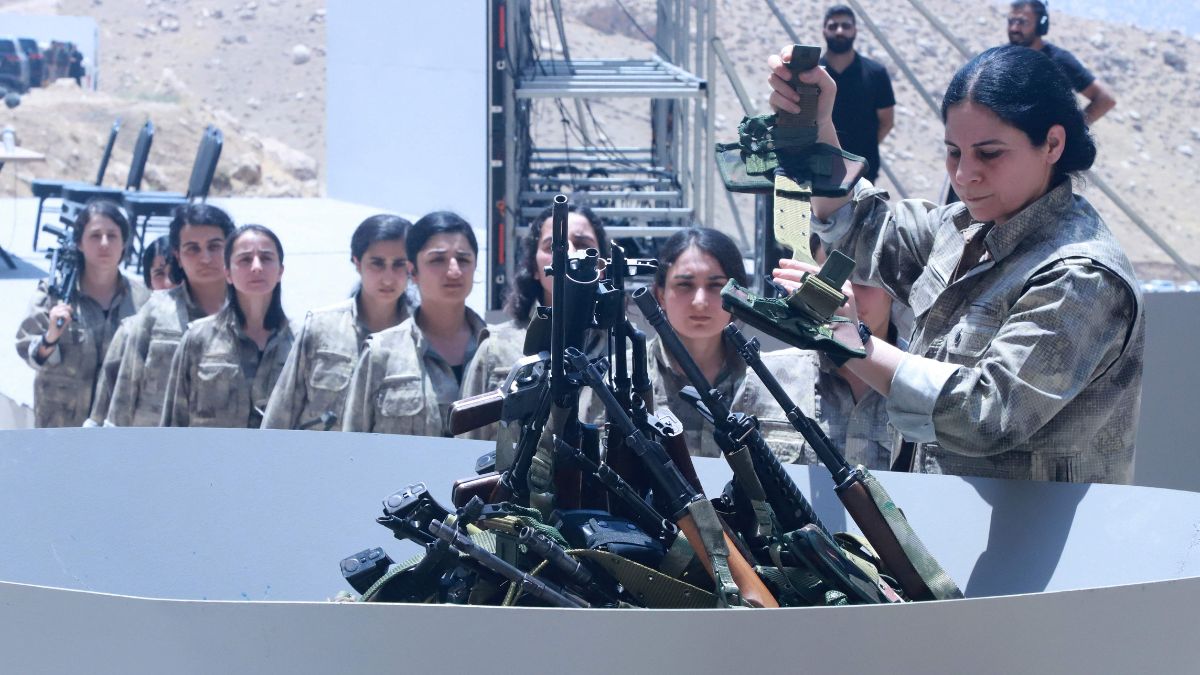Kurdistan Workers’ Party begins disarmament in symbolic ceremony after four decades of conflict against Turkey
 Fighters with the Kurdistan Workers' Party (PKK) line up to put their weapons into a pit during a ceremony in Sulaimaniyah, in Iraq's autonomous Kurdistan region | AFP
Fighters with the Kurdistan Workers' Party (PKK) line up to put their weapons into a pit during a ceremony in Sulaimaniyah, in Iraq's autonomous Kurdistan region | AFP
The outlawed Kurdistan Workers’ Party (PKK) has begun laying down its arms, marking a symbolic end to nearly 40 years of armed struggle against the Turkish state. In a solemn ceremony held on July 11 in the Casene cave near Sulaymaniyah in northern Iraq, around 30 PKK fighters placed their weapons in a cauldron and set it alight. The act is the first in a phased disarmament process expected to continue through the summer.
Turkish President Recep Tayyip Erdogan described the moment as "an important step" towards a Turkey free from terrorism. "May Almighty God grant us success in achieving our goals on this path we walk for the security of our country, the peace of our nation and the establishment of lasting peace in our region," he wrote on X.
A senior Turkish official called the gesture an "irreversible turning point" and a milestone in efforts to end one of the world’s longest-running insurgencies. Iraq’s foreign ministry also welcomed the development, calling it a "significant step toward disarmament".
The ceremony followed the PKK’s announcement in May that it would cease all activities and begin the process of dissolving the organisation. The move came after a call from its jailed founder and leader Abdullah Ocalan, who urged a political resolution to the Kurdish question. In a rare video statement, he also appealed to Turkey’s parliament to set up a commission to guide the peace process.
Founded in 1978, the PKK initially sought an independent Kurdish state within Turkey. Over time, its aims shifted to securing greater cultural rights and regional autonomy for Kurds, who make up an estimated 15 to 20 per cent of Turkey’s population. The conflict has led to more than 40,000 deaths and displaced lakhs of Kurds in the Turkish southeast.
A brief thaw in ties came in 2013, when Ocalan announced a ceasefire, which was in fact approved by the government and the pro-Kurdish Peoples’ Democratic Party (HDP). But the process collapsed two years later amid renewed violence and military operations, especially in cities like Diyarbakir. Erdoğan ordered airstrikes against PKK bases in northern Iraq and went after Kurdish militias in Syria. The Turkish president also demanded full disarmament of the PKK before restarting negotiations.
The shift began in October 2024, when Devlet Bahceli, leader of the ultranationalist MHP and an Erdogan ally, initiated what he called a push for a “terror-free Turkey”. He called on Ocalan to lead the dissolution of the PKK. That appeal paved the way for secret negotiations involving the newly formed pro-Kurdish Dem Party. In February, Dem MPs read Ocalan’s letter in parliament, calling for all groups to lay down arms. He wrote that the PKK had been born out of the absence of democratic space, but now the situation had changed.
In April, Erdogan met with Kurdish politicians, calling it a historic opportunity to dismantle the “wall of terror”. A parliamentary commission is now expected to take the next steps, but it could be delayed by several months with summer recess approaching.
Ocalan’s future, meanwhile, remains uncertain. His prison conditions could be reviewed, but his release is unlikely to be addressed before the final stages of the process. His followers and PKK commanders consider his leadership vital for a lasting settlement.
Bese Hozat, the PKK’s top female commander, underscored this in her statement at the disarmament ceremony: “Ensuring Leader Apo’s (Ocalan) physical freedom via legal guarantees is essential… he should be able to freely lead and manage this process. This is our primary condition and demand. Without this development, it is highly unlikely that the process will continue successfully.”
Middle East